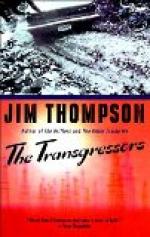“The one who spurned the bribe has been given to understand that if he divulges the nature of the meeting, his life will be the penalty. Notwithstanding this, he has just informed me of the matter. I had to pledge not to make public the information he gave me. But we can counteract the influence of the labor leaders.”
“In what way?” Trueman asks, with deep interest.
“You have made a great mistake,” he continues, before Benson has time to reply. “You never should promise to keep a secret. Publicity would have been our sure means of thwarting their design.”
“If I had not promised to keep the secret I should not have learned of the plot,” protests Benson. “I have an idea that we can bring the labor leaders to terms. We are driven to the wall by the Trust Magnates, who will stop at nothing. We must do what instinct would suggest. The labor leaders shall receive notice that if they attempt to prevent the people from voting, their blow at public suffrage will bring on a revolution. It will be on treacherous leaders of the people that the vengeance will fall.”
“No, no, that will never do. I cannot consent to the use of a threat of violence,” declares Trueman, with emphasis.
“But this is not a question of what you may or may not consent to,” replies Benson. “It is what I will do. I know what I say is certain to be true. To avert an uprising I shall warn the labor leaders myself. You will have no part in this matter. I am determined that the vote of the people shall be recorded at this election.” Benson hurries from the room.
He is soon in secret conference with the leaders at Liberty Hall. They are inclined to scoff at his assertion that the people will resort to violence if they discover that they have again been betrayed; but when Benson repeats the circumstances of the compact between the Magnates and the Labor leaders, with every detail and word, they realize that their positions as leaders are endangered.
With threat and bribe they seek to win Benson to silence. He withstands their blandishments; at the suggestion of a bribe he flies into a passion.
These men are cowards at heart; they have taken the gifts of the Magnates for years, and have contrived to pacify their followers. Now that they are brought face to face with the possibility of exposure, they tremble at the thought of the popular denouncement that will come upon them. They even weigh the chances of physical harm that may befall them. Secretly planning to get the bribe money, they agree to make no attempt to coerce the vote of the people.
“The first word of intimidation or coercion which is spoken will be my signal to expose you,” Benson tells them at parting.
The Trust Magnates remain ignorant that they are sowing the wind. They receive daily reports from the leaders telling of their success in intimidating the masses. To every demand for money the Magnates willingly respond. It is an election where money is not to be spared. Benson and his faithful corps of workers keep a vigilant watch over the Labor leaders.




